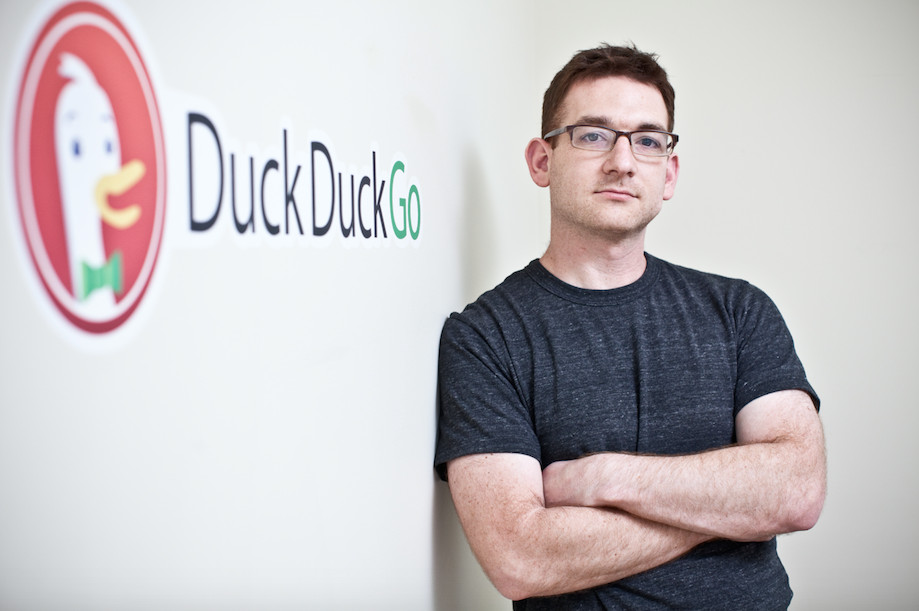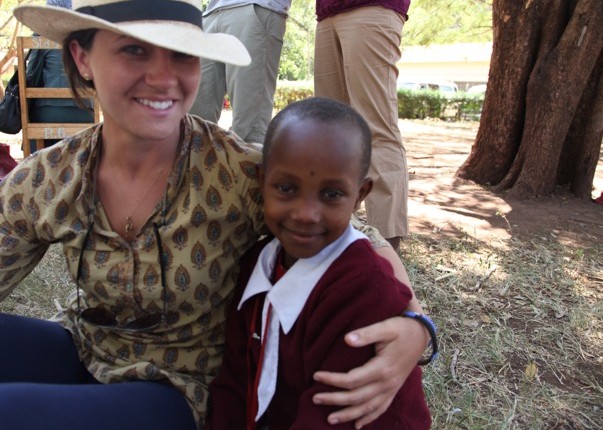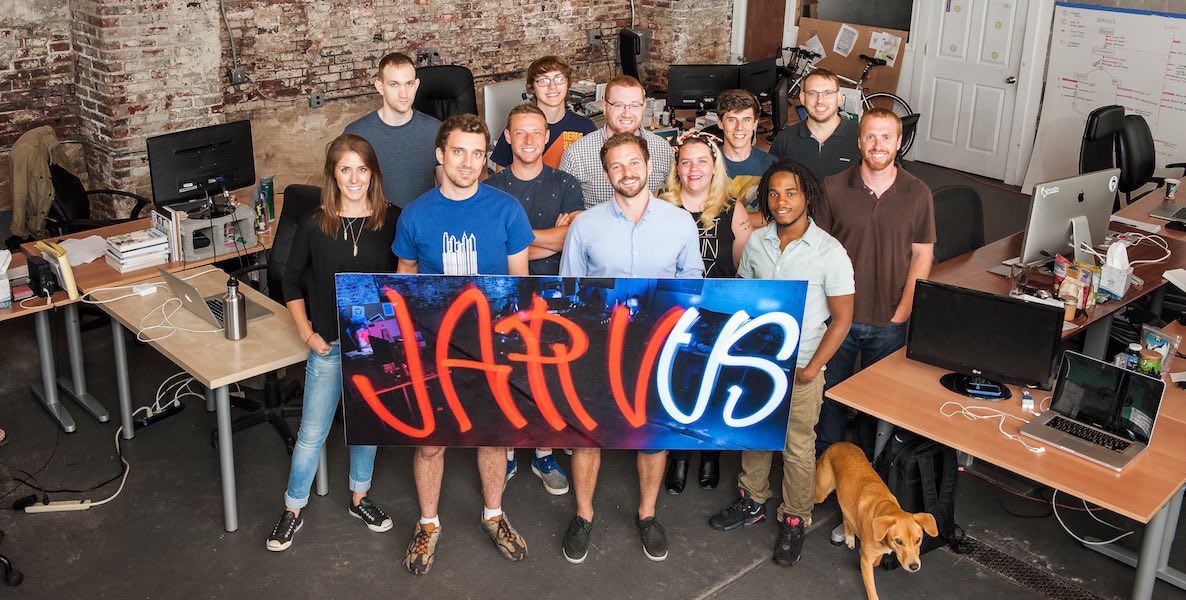Today, Jarvus Innovations is a dynamic web software engineering and design firm with nearly $2 million in revenues, 15 true believer employees, and a cool workspace in Northern Liberties. But a little over a decade ago, co-founders John Fazio and Chris Alfano were high school nerds working at an Internet cafe in the Neshaminy Mall, talking excitedly about how technology was going to change the world.
The more things change, the more they stay the same. Fazio and Alfano still finish each other’s sentences when dreaming up ways to put their tech acumen to work curing our social ills—and, they say, they’ve figured out a business model to support their values. Jarvus—the name is a nod to Jarvis, Iron Man’s artificial intelligence assistant—recently put together an impact report, detailing the current state of the company and its social impact tentacles. It’s one thing to make social impact a priority when you’ve already made it big, but social consciousness often takes a backseat to bottom-line concerns when bootstrapping a business.
That hasn’t been the case at Jarvus, because doing good while doing well has been part of Fazio and Alfano’s mindset ever since their Neshaminy Mall days. “It’s baked into our core,” says Fazio.
When they read Umair Haque’s The New Capitalist Manifesto: Building a Disruptively Better Business, they knew they were on to something. Haque, a London-based futurist and self-described radical economist, holds that the traditional model of gaining profits by shifting costs onto others is fast becoming a thing of the past. Instead, he posits, the 21st Century will be won by “constructive capitalists,” those who renew resources instead of exploiting them and who believe in the power of open systems. Haque gives us Nike, embracing design principles that maximize recycling; Lego opening up its product design to its users; and Nintendo using the Wii to turn gaming into one of the few remaining outlets for social interaction and connection.
“Stakeholders come before shareholders,” Fazio says, summing up Jarvus’s prevailing ethos. (They are not a B Corp—at least, not yet. “I want to learn more about B Corps,” Fazio says. “Plus, I kind of want to prove you can do this without joining any organization.”)
Jarvus seamlessly inculcates social consciousness into its daily life. That’s why Jarvus employees work 30 hour workweeks—at pay comparable to 40 hours—with four vacation weeks and all the telecommuting workers desire. “Happy workers equals happy customers,” they tell their clients.
Jarvus doesn’t just buttress its business with charitable deeds. It seamlessly inculcates social consciousness into its daily life. That’s why, for example, Jarvus employees work 30 hour workweeks—at pay comparable to 40 hours—with four vacation weeks and all the telecommuting workers desire. “Happy workers equals happy customers,” they tell their clients, some of whom initially blanch at the prospect that their vendor won’t pull all-nighters or work weekends.
And that’s why their web development and software business has bankrolled so many offshoot social impact companies, like Slate, Jarvus’s open-source ed learning platform that supports communications between teachers, students and parents; can store school records and assignments; and is adaptable based on schools’ needs. The program is used locally at Science Leadership Academy and Building 21, among other schools, and is now being used by schools interested in innovation throughout the country.
The same mindset informs Jarvus’s N3rd Street Gamers, which offers kids nothing less than an alternative form of competition—not to mention the values sports can instill—to those who aren’t necessarily into hoops and football. Their livestream gaming tournaments have garnered over 1 million viewers. While N3rd Street Gamers isn’t yet profitable, the blueprint for growing into a professional league—an NFL for nerds, if you will—is in the works. (Speaking of N3rd Street, it was Jarvus’s Danny Harvith, singing the transformative effects of community, who persuaded city officials to officially change North Third Street to N3rd Street two years ago.
You’ve heard of all the groundbreaking open data successes of Code For Philly? That’s a Jarvus joint as well, under the auspices of Alfano’s fertile coding mind. A couple of years ago, Fazio and Alfano took on Kevin Clough as a partner, fueling their growth. Clough developed PhillyOpenVendor, an open source contracts aggregator that scrapes information from outdated city procurement websites and arranges it into an easily searchable database of all contract opportunities with the City of Philadelphia. That followed the development of Jarvus’s API Gatekeeper software, which the city now uses as the portal for its growing collection of open data.
Finally, Jarvus walks its own talk. Alfano not only mentors inner city public school techies, he’s hired them, like West Philly’s Nafis Bey, now a Jarvus engineer.
In fact, the breadth of Jarvus’s investments are too many and too varied to totally capture here. (One with significant potential is OnTray, an online food ordering competitor to GrubHub that lives on restaurants’ own websites and accommodates their own branding). The old way of looking at Jarvus is as a web development firm that dabbles in other earnest ventures on the side. That’s the old way.
Instead, Jarvus’s emphasis on a diversified portfolio of social impact investments is the second prong of its 500-year business plan. That’s right. These dudes wrote a 500-year business plan.
The company is just now emerging from that plan’s Era One: The Bootstrapping Years. It involved, in the early years, convincing would-be clients that they needed a website, and securing down payments just to keep the lights on and their bellies not quite full of Ramen noodles. Fazio, who grew up in Lower Moreland, has always been about the hustle. “When I was 13 years old, my father printed up flyers for me and I had clients paying me $200 per week to fix their computers,” he says.
Now, 10 years in, the Jarvus revenue stream has allowed them to expand their culinary interests beyond Ramen. But it hasn’t lessened their hunger. They’re into Era Two: Compounding Growth, where they’re taking their profits and investing in new companies that help grow Jarvus—while advancing their “New Capitalism” mindset.
Jarvus’s emphasis on a diversified portfolio of social impact investments is the second prong of its 500-year business plan. That’s right. These dudes wrote a 500-year business plan.
“If you watch Silicon Valley on HBO, at one point Gavin Belson says to Richard, ‘What is Hoolie if not the best possible outcome of what you’re going to do?’” says Fazio. “That really spoke to me. Because I know why we’re going to be different. Because we’re building a cultural ethos for humanity, and we’ve purposefully done it the hard way, without venture capital.”
Era Three will come in 2026, when Fazio says Jarvus will have $100 million in the bank and will be in the business of building and selling rockets. Uh, Rockets?
“When I was nine years old, I read Isaac Asimov and became obsessed with going to space,” Fazio says. “How do you do it? You build an organization with enough influence, power and capital to build rockets. That’s where we’re heading. From the beginning, it’s been, ‘let’s sell websites today, software tomorrow, and in 20 years, we’ll build and sell rockets.’”
Of the company’s three partners, Fazio is the gregarious visionary, Alfano the more reserved techie, and Clough the corporate guy. But all three are insatiably curious, which makes it all the more telling that, for both Fazio and Alfano, their formal education experiences came up lacking. “We both feel failed by the education system,” says Fazio. “The classroom during the Industrial Revolution was all about controlling the masses. It was like, ‘What do we do with the kids?’ You warehouse them.”
So today, their mission is to take on Industrial Era institutions that stifle innovation. Back at the Neshaminy Mall, shortly after their first meeting, Fazio and Alfano were bonding over Alvin Toffler’s Third Wave, which posited the transformative effects the information age would have on the world. When Fazio says that “Everything we do is about finding ways to decentralize systems, which enables you to identify and avoid choke points,” it’s easy to hear Toffler, the influential futurist who seemed to have Fazio, Alfano and Clough in mind when he described “techno rebels.” Wealth, Toffler wrote, is created everywhere, a nod to globalization; nowhere, a reference to cyberspace, and out there—in outer space. Fazio nods knowingly. Toffler already is one, but if he weren’t, Jarvus’s 500-year business plan would be making a prophet out of him.
Photo header: Courtesy of Jarvus Innovations






